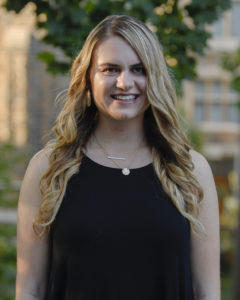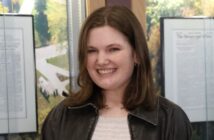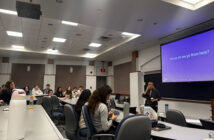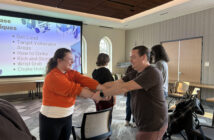
Lauryn Ragone
Less than 10 minutes from Lehigh’s campus, there’s a one-story, L-shaped school building.
An over-sized trailer juts out from the side of the unnoticed building, accommodating refugee students at Newcomer Academy, a school hosting over 200 middle and high school students who have emigrated to Allentown from non-English speaking countries.
According to Pew Research, there are over 110,000 refugees migrating to the United States each year. Allentown acts as a hub for refugee families in Pennsylvania, aiding in the resettlement and placement process. Many families experience trepidation from arriving in a foreign country where they can’t communicate.
The program is structured for students with minimal experience in speaking, reading and writing English. The students are enrolled at Newcomer Academy for one year, participating in a daily transitional English program with two hours of English classes and 90 minutes each of math and science instruction.
Eyes focused and alert, crisp polo shirts and khakis proudly worn. Each morning, these students step off their buses with one goal in mind: to speak and read English.
For two weeks, I experienced the extent of these students’ worlds.
In my years at Lehigh, I attended many campus lectures about different resettlement services for refugees living in the Lehigh Valley. It wasn’t until observing the students at Newcomer Academy that I was truly exposed to the tragic stories of refugees’ journeys to America.
Once families arrive in America, they are supported by local organizations like Bethany Christian Services, the Diocese of Allentown and the Muslim Association of the Lehigh Valley. Refugees, often destitute and homeless, are helped by organizations providing shelter, job-search services and English tutoring.
What happens if the kids had a disrupted education? What happens if certain children never learned to read in their native language? What happens if they don’t speak any English?
The answer for many is Newcomer Academy. These families are given the opportunity for a fresh start.
I observed a disrupted education English classroom of 15 children. The class was for students who had never continuously been in school for more than a year and consisted of Latino, African and Syrian students.
Their ages ranged from 13 to 18 years old with mixed ability in speaking, writing and reading English. I spoke to them with a mix of broken Arabic and basic Spanish, relying heavily on Google images and hand gestures.
Through this, I learned their stories.
Jon. 14 years old. Dominican. After witnessing the murder of his mother and father, he moved to America to live with his great aunt in Allentown. He’s scared to speak English because he’s so far behind his classmates. After school, he works to support his younger brother and great aunt.
Newcomer is Jon’s first step to becoming a teacher.
Alex. 16 years old. Syrian. He hasn’t attended school consistently since third grade. His Middle-Eastern neighborhood was deemed too unsafe to step outside his family’s apartment complex. The moment he arrived in America, he said he felt free.
While both his parents are ill, he manages the household. After school, he works two jobs, flipping burgers at McDonald’s and working at a health clinic, all while babysitting his younger siblings and preparing authentic Syrian dinners for his family. On work breaks, he studies the English dictionary to increase retention and comprehension. Within two months of coming to America, he spoke broken English — the best in his class.
Newcomer is Alex’s first step to becoming a doctor.
Everyone has a story. Everyone has struggles. These students’ biggest setback is the inability to communicate in English.
No one should experience these tribulations at such a young age. At Newcomer, Jon, Alex and their classmates are afforded a fresh start.
Between Allentown community support systems and Newcomer, these students have the opportunity to overcome their language barriers. Transitional English programs integrate students into public schools and, eventually, our society. Students are receiving the opportunity to chase after their passions and dreams.
The secret to these students’ success is practicing English daily: on the bus, in school and at home. Practicing everywhere. Asking for a pencil in the classroom, reading menus, engaging in conversations.
These students only have 180 school days to learn English until they are fully immersed into their Allentown school district.
The students at Newcomer Academy have received a gift. They don’t have a minute to squander time.
—
Lauryn Ragone, ’17, ’18G, is an associate news editor for The Brown and White. She can be reached at lrp217@lehigh.edu.





Comment policy
Comments posted to The Brown and White website are reviewed by a moderator before being approved. Incendiary speech or harassing language, including comments targeted at individuals, may be deemed unacceptable and not published. Spam and other soliciting will also be declined.
The Brown and White also reserves the right to not publish entirely anonymous comments.